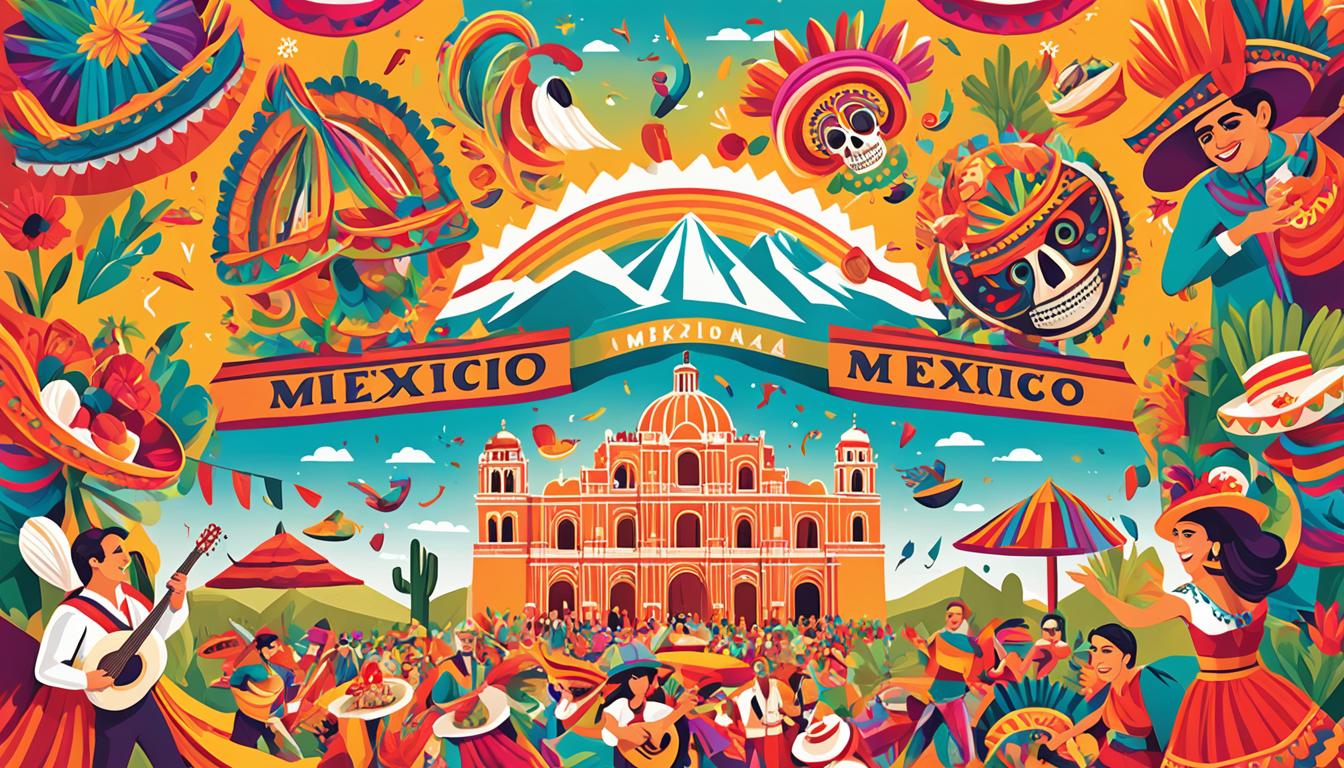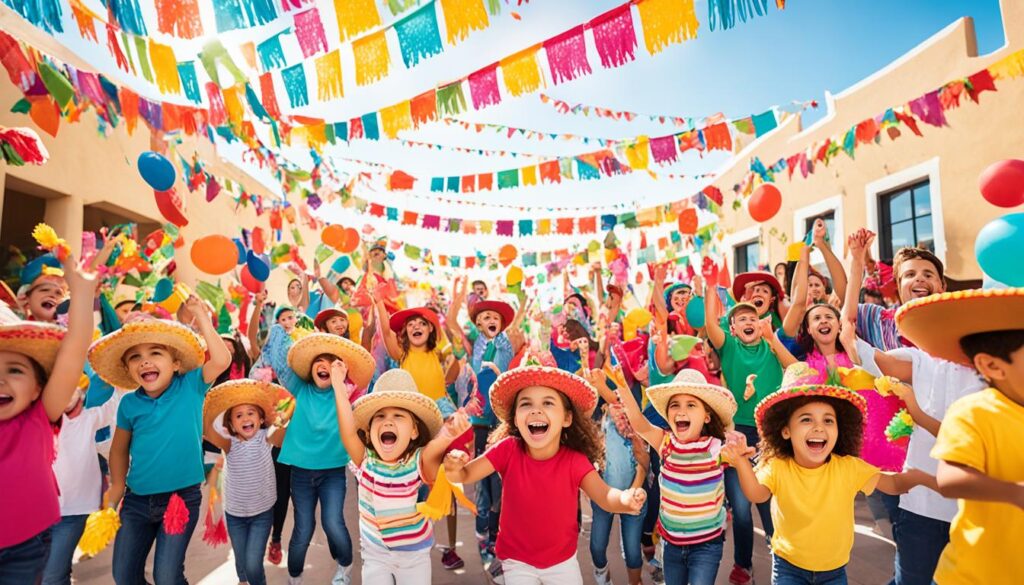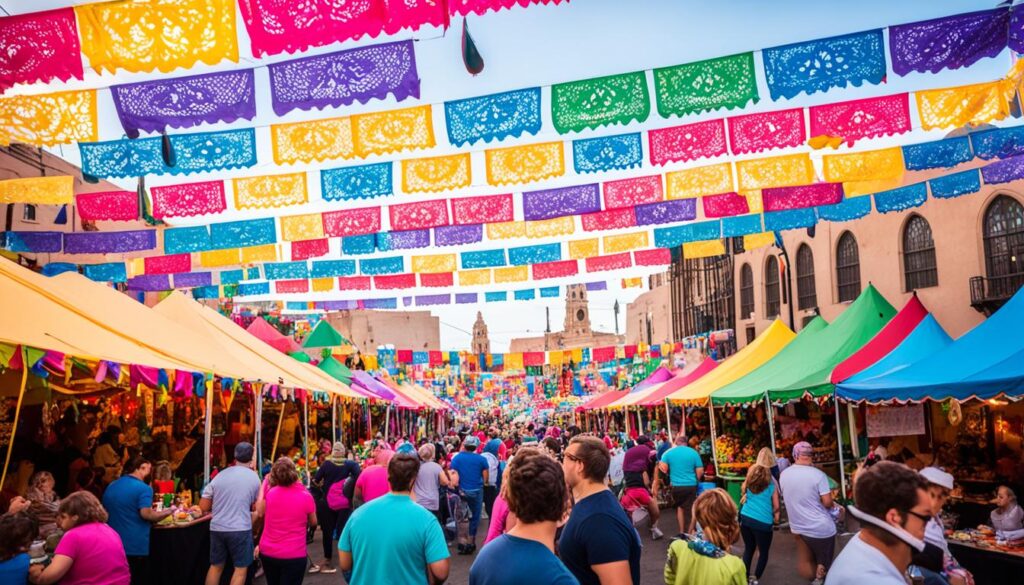
Mexican Festivals Guide – Dates & Celebrations
Imagine wandering through the bustling streets of Mexico, surrounded by vibrant music, energetic dances, and the aroma of delicious food. Mexican festivals are a lively showcase of the country’s rich cultural heritage and traditions. From traditional celebrations to popular fiestas, these cultural events offer a glimpse into the heart and soul of Mexico.
One such festival is Día de los Muertos, or the Day of the Dead. I remember visiting Mexico City during this time, and the streets were adorned with colorful altars, marigold flowers, and sugar skulls. Families gathered in cemeteries, remembering their loved ones who had passed away. It was a beautiful and poignant celebration that showcased the Mexican belief in honoring the ancestors and celebrating the cycle of life.
But that’s just one of the many festivals that take place throughout the year in Mexico. Whether it’s the lively Carnaval in Veracruz, the passionate Independence Day celebrations, or the colorful Guelaguetza festival in Oaxaca, there’s always something exciting happening in Mexico. Each festival offers a unique experience, with its own customs, music, and gastronomy.
In this comprehensive guide, we will explore the dates and celebrations of Mexican festivals, giving you a glimpse into the vibrant tapestry of cultural events that make Mexico such a captivating destination. Join us as we delve into the heart of Mexican traditions and discover the magic of these popular fiestas.
January Festivals in Mexico
In January, Mexico comes alive with vibrant celebrations and cultural events. This month marks the beginning of the new year, and Mexicans embrace the opportunity to come together as families and communities to celebrate their heritage. Two significant festivals take place in January – New Year’s Day and Epiphany.
New Year’s Day
New Year’s Day, known as “Año Nuevo” in Mexico, is a joyous occasion filled with festivities and traditions. Families gather to share a delicious meal, exchange gifts, and reflect on the year that has passed. Streets and plazas are adorned with colorful decorations, and fireworks light up the night sky. It is a time of hope and renewal as Mexicans look forward to the possibilities of the year ahead.
Epiphany
Epiphany, also known as “Día de Reyes” in Mexico, is a religious holiday celebrated on January 6th. This festival commemorates the visit of the Three Kings or Magi to baby Jesus. Mexicans gather to eat “rosca de reyes,” a traditional sweet bread shaped like a crown. Inside the bread, a small figurine of baby Jesus is hidden. Whoever finds the figurine is considered blessed and must host a party on Candlemas, which is celebrated on February 2nd. Epiphany is a time for families to come together, exchange gifts, and rejoice in the spirit of the holiday season.
These January festivals in Mexico reflect the rich cultural heritage and traditions of the country. They are a blend of both festive and religious celebrations, showcasing Mexico’s deep-rooted respect for family, community, and spirituality.
“In January, Mexico comes alive with vibrant celebrations and cultural events.”
| Festival | Date |
|---|---|
| New Year’s Day | January 1st |
| Epiphany | January 6th |
February Festivals in Mexico
In February, Mexico celebrates three significant festivals that showcase the country’s cultural diversity and traditions. From religious ceremonies to national commemorations, these events bring people together to honor their heritage and strengthen their bonds of love and unity.
Candlemass
One of the most beloved Mexican festivals in February is Candlemass, also known as Día de la Candelaria. This religious holiday takes place on February 2nd and marks the presentation of Jesus at the temple. Families gather to attend Mass and participate in a traditional meal known as “tamales.” These delicious treats are made with corn dough, filled with various ingredients, and wrapped in corn husks. It is believed that finding a small figurine of baby Jesus in your tamale brings good luck and blessings throughout the year.
Constitution Day
Another important festival in February is Constitution Day, celebrated on February 5th. This national holiday commemorates the signing of the Mexican Constitution in 1917. Festivities include parades, picnics, parties, and cultural events that highlight the significance of this historical document. People proudly gather to honor their country’s democratic principles and the rights and freedoms it guarantees.
Valentine’s Day
While Valentine’s Day is celebrated worldwide, Mexico puts its own unique twist on this romantic holiday. In addition to celebrating love between partners, Mexicans also celebrate friendship on February 14th. Known as Día del Amor y la Amistad, this day is a time to express gratitude and affection towards friends, family, and loved ones. It is customary to exchange small gifts, chocolates, and heartfelt messages to show appreciation for the people who bring joy and love into our lives.
| Festival | Date | Significance |
|---|---|---|
| Candlemass | February 2nd | Religious day honoring Baby Jesus’ presentation at the temple |
| Constitution Day | February 5th | Commemorates the signing of the Mexican Constitution |
| Valentine’s Day | February 14th | Celebration of love and friendship |
April Festivals in Mexico
In April, Mexico hosts a variety of exciting festivals that showcase the country’s rich cultural heritage and traditions. Two notable festivals celebrated during this month are the Heroic Defense of Veracruz and Children’s Day.
Heroic Defense of Veracruz
The Heroic Defense of Veracruz is a civic holiday celebrated on April 21st every year. This holiday commemorates the bravery and valor of the cadets and navy personnel who defended the city of Veracruz against foreign occupation. The event is marked by parades, reenactments, and memorial services, paying tribute to the heroes who fought to protect their homeland.
Children’s Day
Children’s Day, also known as Día del Niño, is observed on April 30th in Mexico. This special day is dedicated to celebrating and honoring children. Parents and teachers organize various activities and events for children, including gift-giving, cultural performances, and outdoor games. Schools often host mini celebrations to make the day memorable for young students.
Children’s Day in Mexico is an opportunity to emphasize the importance of childhood and create joyful memories for children. It is a time to recognize and appreciate the young ones who hold the future of the country.

| Festival | Date | Celebration |
|---|---|---|
| Heroic Defense of Veracruz | April 21st | Parades, reenactments, memorial services |
| Children’s Day | April 30th | Gift-giving, cultural performances, outdoor games |
September Festivals in Mexico
September is a significant month for Mexican festivals. It is a time when the country comes alive with vibrant celebrations that commemorate important historical events and honor Mexican culture. Two notable festivals that take place in September are the Cry of Dolores and Independence Day.
The Cry of Dolores
The Cry of Dolores is a fundamental part of Mexican history and marks the beginning of the Mexican War of Independence. On September 16th, 1810, the independence leader Miguel Hidalgo rang the bells of the church in Dolores, calling upon the people to rise up against Spanish rule. This momentous event is commemorated each year with fervor and patriotism.

Independence Day
September 16th is also celebrated as Independence Day in Mexico. This national holiday is a time for Mexicans to come together and honor their country’s autonomy. Festivities include colorful parades, dazzling fireworks, and lively street parties across Mexico. It is a day filled with national pride and joy.
Both the Cry of Dolores and Independence Day hold immense cultural and historical significance in Mexico. These festivals symbolize the resilience and indomitable spirit of the Mexican people, highlighting their fight for freedom and their unwavering love for their country.
November Festivals in Mexico
November is a month filled with vibrant celebrations in Mexico, as it brings two major festivals that showcase the country’s rich cultural heritage and traditions. The first is the Day of the Dead, a heartfelt occasion where families gather to remember and honor their loved ones who have passed away. This festival is characterized by colorful parades, intricate offerings, and elaborate costumes that represent the spirits of the departed. It is a time of remembrance, reflection, and celebration of life.
The second significant festival in November is the Day of the Race, which honors Mexico’s indigenous people and their contribution to the nation’s history and culture. On this day, people from different indigenous communities come together dressed in traditional clothing to participate in lively festivities. It is a time to recognize and appreciate the rich cultural diversity that makes Mexico so unique.
These November festivals not only provide a glimpse into the traditional customs and beliefs of the Mexican people but also serve as a way to promote unity and cultural exchange. The joyous atmosphere, vibrant colors, and lively music create an unforgettable experience for both locals and visitors alike. Whether you are observing the Day of the Dead or joining in the festivities of the Day of the Race, you will be immersed in the spirit of Mexico and its deep-rooted traditions.
Source Links
- https://www.journeymexico.com/blog/mexican-celebrations
- https://traveltriangle.com/blog/mexican-festivals/
- https://www.wandersmiles.com/mexican-festivals/

Leave a Reply